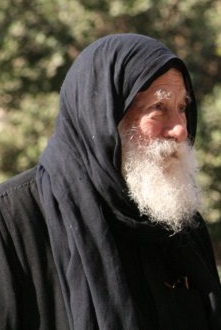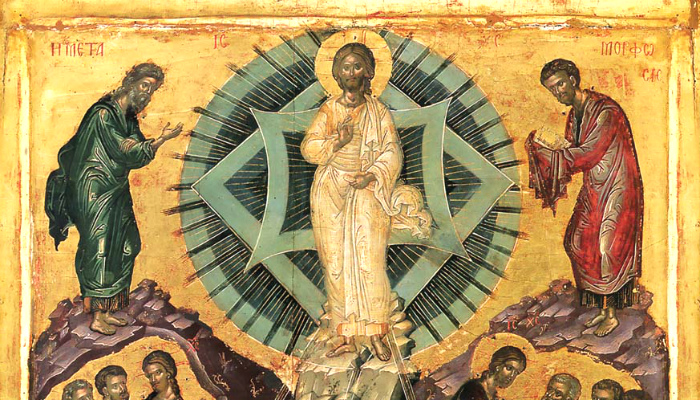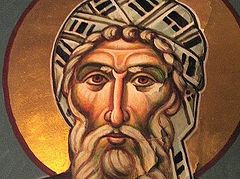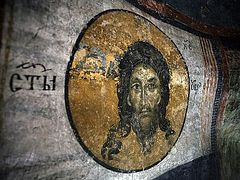There is one more issue to consider which is central to the Orthodox concept of salvation, and that is deification. I will relate what I have learned from an Orthodox priest who is a university professor. This father is fluent in Arabic and has studied the Chalcedonian/Non-Chalcedonian positions.
The Copts are presently divided over deification. On the one hand, there is Fr. Matta al-Miskeen (“Matthew the Poor”, 1919-2006)—the late spiritual father of the monastery of St. Macarius in Scetis, who emphatically taught deification (and that Communion is of the WHOLE Christ, divinity and humanity). On the other hand, you have the late Pope Shenouda (1923-2012, pope 1971-2012), who denied deification, called it a heresy, and even denied that the Church Fathers ever taught such a doctrine (he also denied that in Communion we partake of the whole Christ, and argued instead that we partake of His humanity alone)! The controversy between Pope Shenouda and Fr. Matta was very public.
From what I understand, Fr. Matta’s views are quite popular today among many Coptic monastics, clergy, and educated laymen, while others follow the late Pope Shenouda’s view. The present Pope Thawadros has not really taken a stance in this controversy, and there has been no conciliar decision on the subject.
For their stances on deification and related issues, Pope Shenouda and Fr. Matta drew on divergent sources. Pope Shenouda drew on the Coptic medieval tradition, in Arabic, which to a large degree suppressed deification. Fr. Matta drew directly on Greek Patristic sources available to him in translations into European languages and on modern Patristic scholarship, in which deification is, of course, prominently present.
This is certainly one significant difference between the Copts (at least those who follow Pope Shenouda) on the one hand and us, Chalcedonian Orthodox, on the other. There are other differences as well. For example, one of the consequences of “monophysitism” (or, to use the more “politically correct” term, “miaphysitism”) is that anti-Chalcedonian Christians (such as the Copts) also believe in ONE WILL in Christ (what we call “monotheletism”), a view rejected by St. Maximos the Confessor and the Sixth Ecumenical Council.
 Fr. Matthew the Poor. Photo: citydesert.files.wordpress.com These issues brought up by the Father university professor should be given serious consideration by our Orthodox Church.
Fr. Matthew the Poor. Photo: citydesert.files.wordpress.com These issues brought up by the Father university professor should be given serious consideration by our Orthodox Church.
I would like to add a bit about Fr. Matthew the Poor since he has acquired a reputation in the English speaking world. He was renowned mentor for monastics and has written a book on prayer which has been translated into English and published in 2003 by St. Vladimir’s Orthodox Seminary Press: Orthodox Prayer Life: The Interior Way. John Watson, in his article, “Abouna Matta El Meskeen Contemporary Desert Mystic,” speaks of the success of this book. “In Arabic it was certainly a key text for Coptic monastic spirituality… It is perhaps not too much to say that his book on Orthodox Prayer has defined the prayer life of thousands of English language readers at the beginning of this century.” Watson continues to tell us of the foundation of Orthodox Prayer Life: The interior Way:
The primary source of Orthodox Prayer Life: The Interior Way was a typed English-language text. Abouna Matta had packed the modest manuscript of only one hundred and twenty-two, doubled spaced, and typewritten pages into his bag. He did not open the English document because he was in a hurry to embark on the solitary life, which began for him in 1948:
“When I finally opened the manuscript of the English pilgrim and found that it contained sayings on prayer, my heart leap for joy. A wave of happiness and exhilaration overwhelmed me. How did God bring this treasure into my hand?”…
The typewritten text was the creation of a British pilgrim who had visited Jerusalem. For the rest of his life, Abouna Matta acknowledged the influence of the English-language writer and the central value of the small booklet, which he had received so long ago.
The author of the text was Archimandrite Lazarus Moore. Again Watson continues to speak of the additional sources of Fr. Matthew the Poor’s book:
For the next fifty plus years Abouna Matta El Meskeen lived with the much-loved little text, translated and typed by Achimandrite Lazarus Moore. But in each decade of his monastic and ascetic life, the Coptic father of the Western desert expanded the primary Russian sources into a major commentary on classical Eastern Orthodox spirituality. Father Matthew had carefully classified and spiritually reshaped an extraordinary series of inspired texts from early Middle Eastern Christianity to nineteenth century Orthodox Russia.
I hope the point I am trying to emphasize is clear: the influence of the teachings of the Orthodox Church on the Coptic monk, Matthew the Poor. It is impossible to have such a thorough study of the Orthodox ascetic tradition such as he shows, and not be introduced to the Orthodox concept of deification. Abouna Matta El Meskeen was “a main” if not “the main” propagator of deification among the Coptic Christians—and as was mentioned earlier, his conflict with Pope Shenuda over this issue was quite public. And it seems clear that in order to take hold of the concept of deification he had to come to the Orthodox Church.
So then, what can we now conclude? Although from the Orthodox perspective, there are serious flaws overall, on the part of the Coptic Christians, specifically in reference to Christology/Soteriology, they have been coming closer to us. But their coming closer to us, was a result of what they have learned from the Orthodox Church—they did not theologize on their own. So is it right to say: “We have believed the same thing all along” or that “They are already Orthodox?”




By the way, you have no right to judge an apostolic Church about its orthodoxy, especially when you talk about rumors that are not based on identified sources.
It mat be better that you focus on your faith at first before judging someone else'
God bless!
Mina